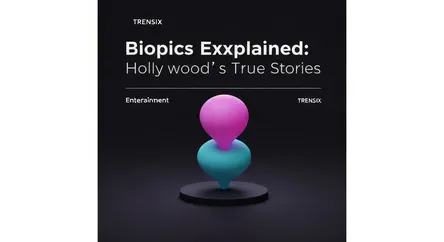Entertainment
Biopics Explained: Hollywood's True Stories

Explore the world of biopics, films that bring real-life stories to the big screen. Learn why this genre consistently captivates global audiences.
What is it?
A biopic, short for "biographical picture," is a film genre that dramatizes the life of a real person. Unlike documentaries, biopics often use artistic license to tell a compelling narrative, focusing on key events and relationships that shaped the subject's life. These films span various fields, from musicians and politicians to scientists and artists, offering a cinematic window into the lives of influential or extraordinary individuals. The core of a biopic is its foundation in a true story, aiming to capture the essence and impact of its central figure for the audience.
Why is it trending?
Biopics are perpetually popular due to their unique blend of education and entertainment. Audiences are drawn to the familiarity of a known story and the chance to gain deeper insight into figures they admire. The genre is also a magnet for critical acclaim, with performances in biopics frequently earning major awards, such as Oscars. Studios favor them for their built-in marketing appeal and potential for prestige. Recent successes like "Oppenheimer" and "Priscilla" have reaffirmed the genre's box office and cultural power, keeping them a consistent staple in cinemas.
How does it affect people?
Biopics have a powerful influence on public perception. They can humanize historical icons, introduce forgotten figures to new generations, and inspire viewers through tales of perseverance and achievement. However, they also spark debate about historical accuracy versus dramatic storytelling. The creative liberties taken can sometimes reshape a person's legacy in the public consciousness, for better or worse. This tension between fact and fiction encourages viewers to engage critically with history and the media they consume, questioning how stories are told and remembered.